Water – The drink of the Gods? Why is it worth to drink it?
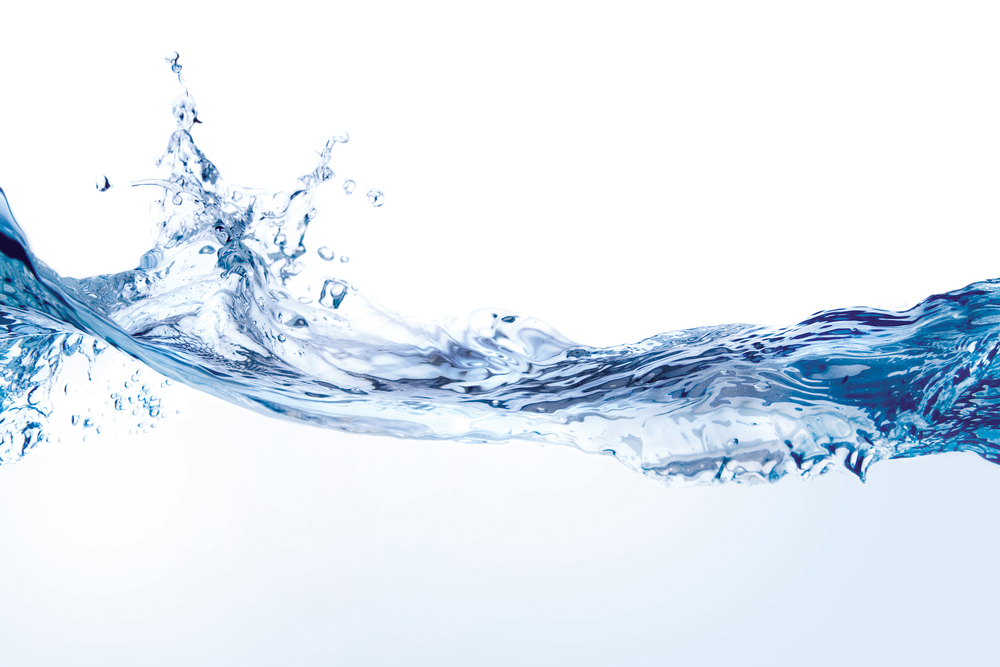
Water maintains proper balance of our bodies and makes up to 60% of the volume of the human body. And this is not the only thing what makes it special. Everything that surrounds up has something to do with it, without it there would be no life on Earth. Soon after macronutrients: protein, fats, carbohydrates there is water. Supplementing it everyday is crucial to maintain good condition of the whole organism and good well-being. Its deficit can lead to fatigue, pain, dizziness, the effect of dried flaccid skin and even more serious complications preventing normal functioning. Below we present more thoroughly the benefits of regular hydration of the organism, causes and effects of dehydration, the advised norm of water to drink everyday and ways to deal with water retention.
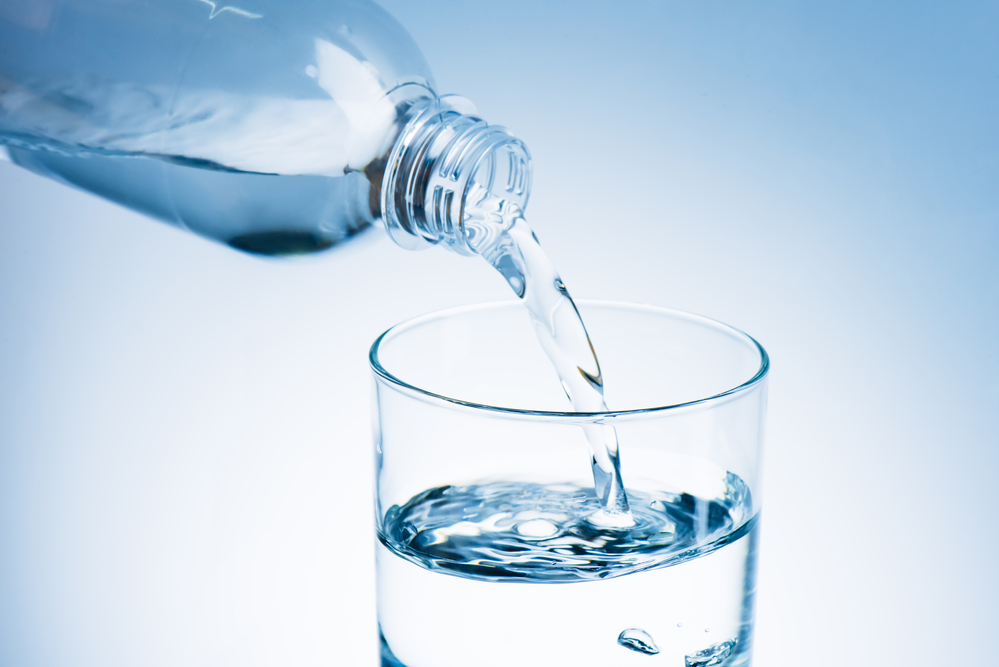
Water – table of contents:
- What are the benefits of regular water drinking?
- How many % of water is in human body? Facts
- Why is it worth to drink water?
- What is the role of water in human body?
- Water deficit in the organism – symptoms
- Effects of dehydration
- What are the causes of dehydration?
- How much water should you drink daily?
- How to control the amount of drunk water and maintain hydration of the organism?
- Diet to maintain proper balance of water in the organism
- What is water retention in organism?
- How to get rid of excess of water from the organism?
What are the benefits of regular water drinking?
It’s no secret that water is crucial in life. It makes up a huge part of our organism, quenches thirst and is in the composition of various food products. Benefits of good hydration can be listed with no end. Proper amount of it during a day is advised and provides:
- Helps with skin hydration – what directly translates to its elasticity.
- Maintains the acid-base balance of the body – what protects our bodies from acidification.
- Supports kidney function – filters out toxins from the organism, provides proper filtration of waste substances to be exact.
- Removes the excess of water gathering beneath the tissue – so called “edema”.
- Oxygenates the organism – making us sleep better and have more energy.
- Reduces the feeling of fatigue – for example, on a hot day a sip of water gives an effect of immediate refreshment and a spur of energy.
- Influences the beauty maintenance – well-hydrated skin becomes more nourished and firm. Its protective barrier is also enhanced, which protects the epidermis from excessive drying, for example as a cause of weather conditions: sun, wind, frost and smog.

Get to know about different benefits of water drinking
- Drunk before meal reduces appetite – it is a so-called weight loss trick advised for people keeping a diet. Water fills the stomach helping to feel satiated more easily, thanks to that one can reduce the amount of ingested calories. So it also helps to lose weight.
- Promotes digestion – it is in all of the fluids and excretions of the organism: digestion fluids, saliva. Without it all the metabolism would be hindered.
- Maintains proper balance and good condition of the whole organism.
- Allows us to live and function – Because dehydration, in extreme cases, can cause even death.
- Maintains well-being and concentration – protecting from negative effects of dehydration e.g. headache and fatigue.
- Regulates blood circulation and body temperature.
- Keeps the joints healthy – through hydration of joint cartilage
- Reduces cellulite.
How many % of water is in the human organism? Facts
About 60% – this is the amount of overall human body mass, which water makes up.
70% to even 80% – is in a body of an athlete, which have a very developed fatless muscle mass.
75% – in case of children.
80% – in case of infants, that is why it is vital that in case of viral or bacterial infections to prevent dehydration, which can develop rapidly.
80% – in lungs
83% – kidneys
83% – blood
79% – heart
74% to 80% – muscles
72% – skin
64% – liver
25% – bones
Only up to 10% in fat tissue
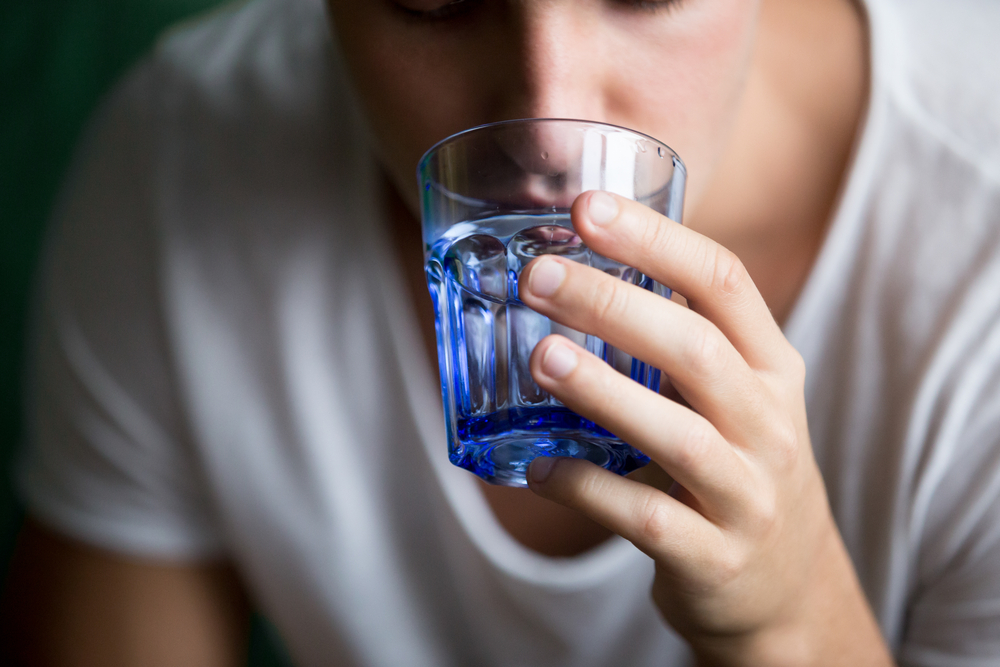
Why is it worth to drink water?
We can easily state that particular tissues and cells of our body are filled with water and constant supply of it is necessary to maintain their proper functioning. Its regular supplementation allows to keep good well-being and condition. Daily, regular hydration is also increasing body’s endurance and protection from sudden loss of energy. Water also influences, so very important, looks, maintaining proper hydration of skin protecting the epidermis from the loss of humidity.
What is the role of water in the human body?
The main role of water is being the building block, because it makes up to a large extent the tissues and cells of the human body. To its tasks we can appoint, transport of nutrients together with blood throughout the whole body and without this whole process would be practically impossible. Water is also crucial in all metabolic processes, starting from digestion and ending on exertion of waste products of the metabolism.

Water deficit in the human body – symptoms
What are the symptoms of the water deficit in the human body? How to recognize it?
- Dryness in mouth or elevated thirst? – Thirst is not only a delicate warning, but an alarms telling that the organism has a water deficit. It is a sign that it is absolutely necessary to take care of hydration to avoid severe state of dehydration.
How to recognize that you don’t supply your organism with a sufficient amount of water?
-
- you feel dryness in your mouth,
- immediately after shower you feel the need to moisturize your body with a balm,
- Your skin loses elasticity and becomes flaky,
- Pimples start to appear on Your skin
- nails start to break easily
- feel joint pains
- feel sad quite often
- experience dizziness and headaches,
- have bad breath – even if you have recently brushed your teeth,
- have trouble maintain proper weight – you gain weight,
- feel hungry, despite eating recently or you lack appetite at all,
- have a distended stomach and constipation
- feel constantly exhausted and sleepy all throughout the day, however you have trouble falling asleep at night.
That is not all! – Lack of sufficient amount of water is felt in nearly every aspect of our functioning. That is why you have to remember to drink water before you feel thirsty. If that is a problem for you try to develop a water drinking habit.
Water – effects of dehydration
If you do not react in time and you wouldn’t take proper care of the organism’s hydration, the first symptoms of dehydration could become in so much more serious health consequences. Among effects of dehydration there are:
- Elevated heartbeat,
- Lowered aerobic capacity of the organism, which causes quick fatigue and slowed transport of nutrient, which get to the cells with oxygen and blood,
- Psychological disorders, delirium states – hallucinations, disorientation,
- Seizures
- Orthostatic hypotension – fluctuations of blood pressure connected to the change of body position, sudden movements cause head dizziness, spots in front of the eyes, temporary imbalance and fainting-like condition.
- Respiratory problems,
- Impaired circulatory and thermoregulatory balance, leading even to heat stroke,
- Circulatory collapse.
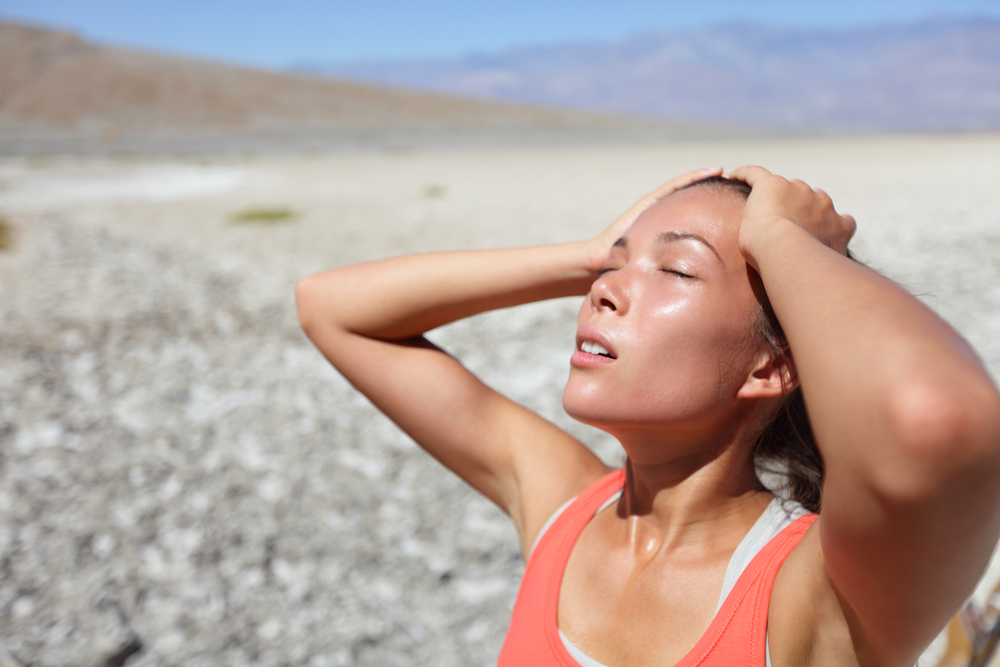
Water – what are the causes of dehydration?
One of the main reasons behind organism’s dehydration is too little or dangerously low ingestion of water, from food as well, which are also its source. However, this aspect can be easily excluded by remembering to supply water regularly throughout the day. Other causes, which can lead to dehydration are: diarrhea, fever, nausea, diabetes (hyperglycemia and glycosuria), kidney diseases, Parkinson’s disease (due to appetite loss and difficulties swallowing), hypotonia, malnutrition, extreme heats and high temperature (through oversweating), too intensive, exhausting physical work and through ingesting too much salt, caffeine or alcohol.
How much water should you drink every day?
You can often hear popular saying: “Drink more water!”. But what does it mean?
Common advise says that an adult should drink about 2l of water daily. However, this amount is averaged and everything should be calculated according to out body weight, intensity of everyday life, additional physical activities, time of year, gender, age or even time spent on fresh air. There is a method saying that average person should drink 30 ml of water per every kg of body mass. So one should multiply it accordingly, for example, a person weighing 65 kg should drink: 65 kg x 30 ml = 1950 ml.
The results is in milliliters, after moving the coma three places to the left or dividing the result by 1000 we get: 1,95 of a liter. This is an individual amount of daily need for water by a person weighing 65 kg. If you are a person actively participating in sports, you should drink additional 2 l of fluids during training. The amount of drunk water is also influenced by the time of year and the temperature of the environment – in a very hot summer you should also reach for an additional glass of water, which is over the appointed amount. Although, a regular person, who does not participate in physical activity a lot during a day, should stick to 2l a day as mentioned above. Alternatively, use the exact formula to calculate the proper, individual amount.
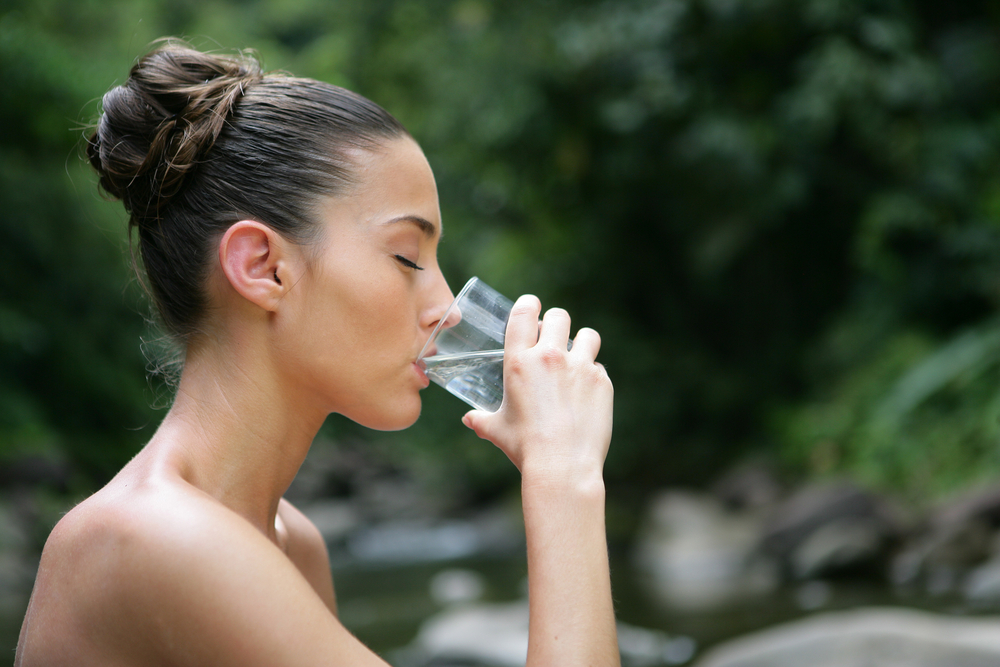
How to control proper amount of drunk water and maintain hydration of the organism?
It is worth to have a bottle of water everywhere: at work, in the car, next to the bed in the bedroom, in a handbag or right next to the computer. You should always take a water bottle to a gym or for other physical activities like: running, cycling and often with small sips drink water. Working out permanent changes and introducing new routine can pose a very difficult task. However, in some time you will instinctively reach for a glass of water. That is why it is important, to have it within eye sight to let the subconscious remind you about the need for water.
If keeping thorough notes in the calendar is hard to do and looks to be ridiculous. There are apps, which pose a great alternative. You can download them to your phone and at every drink note the amount drunk. Moreover, another benefit coming from keeping notes in an app is that you will get notifications about the need to reach for a glass of water – what will help you to develop a habit of drinking water. Yet another benefit is an access to statistics, which will help you to eliminate mistakes and implement changes.
Remember to do everything carefully. Day by day you can one glass of water. If you can’t make yourself to drink regular water add a slice of lemon or some leaves of fresh mint. After only a few days of proper hydration you will see the benefits which come from regular water drinking.
Diet in maintenance of proper water balance of the organism
Yes, diet is an important aspect when trying to maintain proper level of organism hydration. Together with food some of the needed everyday amount of water is sufficed. Diet bring about 20% to 30% of daily need. However, in the times of highly processed foods the percentage of water is really small. Anyway, who chooses fresh vegetables every day, which are full of water or eats soup for dinner? Presumably only a small amount of people.
That is why you should play attention to the thigs which land on your plate. A good choice is including vegetables and fruits in the everyday diet, which are naturally full of water. Alternatively drinking juices made from them, with simultaneous control over how much sugar or salt we supply with this kind of drinks.

To maintain proper water-electrolyte balance eat fruits and vegetables with potassium content.
Among the vegetables are: potatoes, pumpkin, eggplant, sweet potatoes, zucchini, celery, asparagus, garlic, spinach, beetroot, beetroot, celery, leek, kale, carrots, peppers or parsley. The fruits are: bananas, apricots, currants, avocados, grapefruit, gooseberries, pineapple, tomatoes, kiwi, melon or peaches.
Limit the amount of eaten salt, its norm is about 5-6 g (1 teaspoon). But remember, that it is hidden in many processed foods. Pay attention to coffee, black tea, sweetened drinks and alcohol – their consumption can lead to water retention in the organism. A good alternative are herbal teas, e. g. nettle, fennel, elderberry, mint, parsley leaf, sage, coriander, chamomile, borage leaves or dandelion. Additionally, they act as diuretics and help to remove excess water.
What is water retention in the organism?
One of the main causes of water retention is dehydration. That is a way in which our body can react to the state of water deficit, one can say, it is a primal defense response. When water balance is negative, the organism creates water reserves, saving it in various tissues, to have an easy access to it in times of sweating or starvation. In effect, the weight is increasing, uncomfortable edemas and swelling of various body parts occur. Other stimuli causing water retention in the organism are:
- Bad diet – full of processed foods with high salt content, which in excess binds water, leading to its retention in intercellular spaces.
- Lack of movement – this one favors worse circulation and creates conditions to develop edemas and uncomfortable swelling.
- Hormonal changes – caused by high concentration of estrogens, connected to menstrual cycle, pregnancy, taking contraceptives or thyroid problems.
- Diseases could also be the cause – problems with kidneys, heart, liver, thyroid, circulatory system, thrombosis or hypertension.
- Alcohol
- Side effects of taking some drugs.
- High temperature.

How to remove water excess from the organism?
To restore the balance of the organism and exert accumulated water one should:
- Drink water often, yet in small sips – however sounding paradoxically, it will help to reach the proper level of hydration, simultaneously exerting the excess of water. Daily norm is about 2 liters.
- Drink herbal teas – acting as diuretics.
- Remember about physical activity – moving promotes better blood and lymph circulation. And additionally during exercise, water, toxins can be removed with sweat.
- Do massages stimulating circulation – they will help to fight swelling and will restore elasticity of the skin.
- Eat fruits and vegetables – not only they are an additional source of water, but also contain potassium, which helps to maintain proper hydration.
- Pick products high in potassium – it regulates the water balance and removes the excess of fluids from the intercellular space.
- Limit salt, coffee, black, strong tea, sweetened drinks and alcohol.
- Exclude highly processed foods – which is depleted of water, but also contains salt (which is sodium). These are not only ready meals, fast foods, salty snacks, but also sweets, cookies and candy bars, which have hidden sodium.
- Include fiber in your diet – it will help to clear your bowels from the excess of water, which can also accumulate up there.
